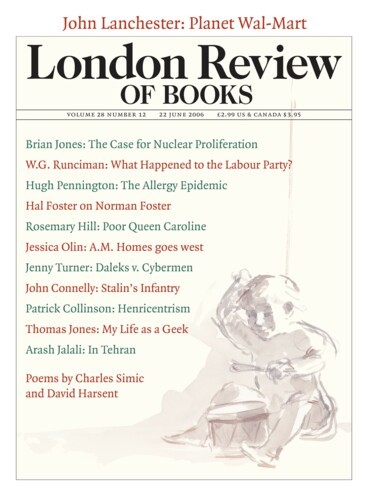As a Manchester United supporter who was born and grew up in Bristol, I have long been the subject of derision. There are loads of jokes. How many United fans does it take to change a light bulb? Answer: 480,001 – one to change it, 80,000 to say they’ve been changing it for years and 400,000 in the Home Counties to buy the replica kit. (And so on: that’s a gentle example.) Let it not be said, however, that I’m one of those part-time, long-distance fans who’s never set foot inside Old Trafford. I went in 1977, when I was nine. Bristol City, during their brief spell in the top division, squeezed an away win: it was divine retribution for disloyalty to my hometown.
The reason I’m a Manchester United supporter is that my father is one. But he, too, violates the codes of Proper Fandom (true authenticity = localism + failure). He became a supporter in 1948, when he was a pupil at Roskear Primary School, Camborne, Cornwall. An older cousin told him ‘you have to have a team’ and he picked the faraway club that had just won the Cup Final: United triumphed over Stanley Matthews’s Blackpool 4-2 in a match which has gone down as being ‘one of the best finals ever’. This was the first trophy won by Matt Busby, who had been United’s manager since the end of the war. My dad, an eager new fan, was a Busby Babe.
Of the books on my parents’ shelves, the one I remember taking down first was The Day a Team Died, by Frank Taylor. The title was so dramatic, and on the spine the letters d i e d were coloured red and arranged out of line like skittles that had just been hit. My father was memorably solemn as he told me the book was about the Munich Air Disaster of February 1958, when the plane bringing home United’s prodigious young team from a European Cup tie in Belgrade failed to take off from a slush-covered runway in Munich and ploughed into a house and a tree. Eight players died, including my father’s hero from radio commentaries and newspaper reports, Duncan Edwards, the left-half still often claimed to be England’s best-ever player. At 18, he was the youngest ever to be picked for the full national team – until Wayne Rooney and Theo Walcott.
Frank Taylor, who covered the Belgrade match for the News Chronicle, was the only one of the nine journalists on the plane to survive. His book, published in 1960, is a gentlemanly affair, full of praise for the sweet-faced German nurses and the players ‘so young . . . so strong . . . so brave’. Munich quickly became the key element in United’s folklore (youth + talent + death = legend), but the story has recently become more vexed. Harry Gregg, goalkeeper and hero of the crash (he carried a baby and several players from the burning plane, among them Bobby Charlton), has spoken out with some bitterness. For him, the crash has ‘become an industry, which certain people have perpetuated and profited from through half-truths, outright lies, myth, distortion and exaggeration’. One of his targets is his fellow player Bill Foulkes, who, Gregg contends, can’t face up to the fact that he ran away from the scene.
In Legends of United: The Heroes of the Busby Era (Orion, June), David Meek allows that the disaster ‘contributed to the club’s worldwide popularity’ and hence its stockmarket value, but Jeff Connor, author of The Lost Babes: Manchester United and the Forgotten Victims of Munich (Harper, February), is less cautious. Like Meek he has interviewed Harry Gregg and lays into Man Utd plc for exploiting the crash while neglecting the victims’ families. All that an institution ‘valued at one billion pounds’ has offered them over the years is ‘the occasional match ticket’.
The United kit I had in the late 1970s was a replica of the one worn by Arthur Albiston, Steve Coppell and co. But I told my father, who’d bought the kit, that he must never come to watch me when I played for the local team (under-11s, under-13s etc). I’m not sure why: my parents weren’t forbidding, and it wasn’t as if I took the kind of role in a match that would be affected by a bout of self-consciousness: I was a toe-punting left-back, a stopper who felt peculiar straying beyond the halfway line.
I scored only once (not counting own goals, of which there were several), for Nailsea Athletic against Backwell Athletic, on Backwell’s ridiculously sloping pitch – and, against all odds, my dad was there to see it. The ground was closer to our house even than Nailsea’s and he thought he’d come along, but, knowing what I was like, put on a disguise. Merely a long coat and a hat he never wore, but it did the job: I had no idea he was there. Had I known, I might have refrained from running around in amazed delight after I had tapped the ball in shouting ‘I’ve scored! I’ve scored!’ It was the highlight of my playing career: when many years later I turned out for a college team, an observant coach noted that I might have been a half-decent defender had I only realised I was naturally right-footed.
Send Letters To:
The Editor
London Review of Books,
28 Little Russell Street
London, WC1A 2HN
letters@lrb.co.uk
Please include name, address, and a telephone number.

